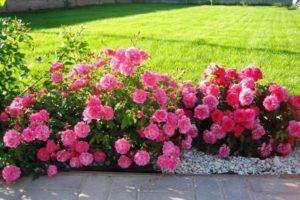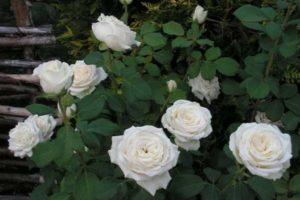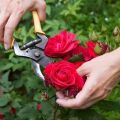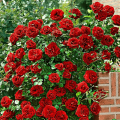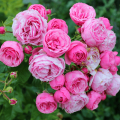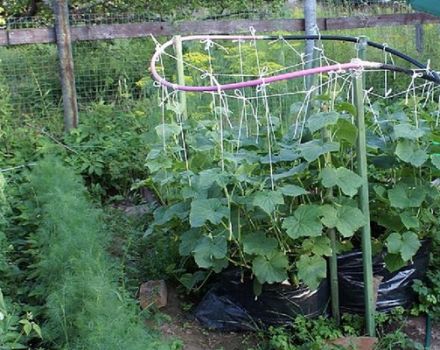Description of the Cordana rose variety, planting and care, reproduction at home
Cordana rose is the smallest in the world. The buds are the same as those of classic roses, not inferior in beauty to other types. This variety requires special care and compliance with the rules. A distinctive feature is the absence of odor. A small shrub suitable for rose lovers who do not have the opportunity to grow them on their own plot. They also look great in landscaping with a combination of other species. Decorate borders and flower beds.
Basic information about the variety
This rose variety takes root well indoors and in the garden. Long bloom - almost 6 months. The first flowers bloom in May, periodically renewed with new ones, flowering continues until October. The leaves are bright, green, teardrop-shaped. The plant reaches a height of 30 centimeters. Flowers come in different colors: white, pink, yellow, red. Bushy plant, branches are densely arranged, looks like a bouquet of roses. You can buy a flower at any flower shop in any season.
Conditions of detention
Caring for a Cordana rose when grown outdoors or at home requires some effort. If certain growing rules are not followed, the bush dies.
Lighting requirement
Demanding on bright lighting. Daylight hours for the Cordana rose mix should last at least 8 hours a day. In winter, backlighting is carried out using special fluorescent lamps. A window sill on the sunny side of the house is considered a suitable place in the house for her.
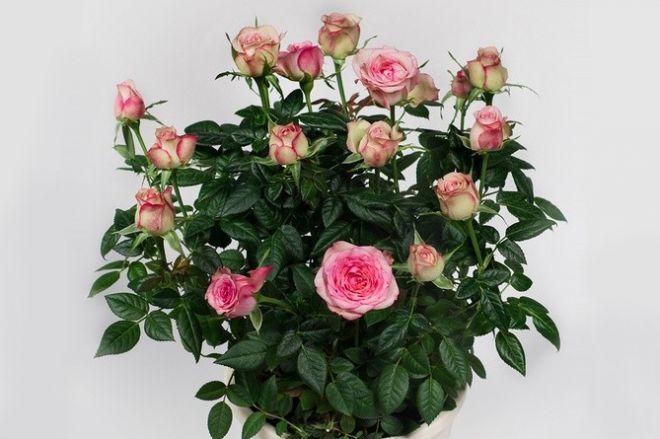
Temperature for growing roses
When exposed to frost, the plant will die, the optimum temperature is 14-20 ° C. It tolerates heat easily, the main thing is to ensure that there is no drying out. The plant loves well-ventilated rooms, but it should not be exposed to a draft.
If the bush grows in the open air, it is recommended to monitor the air temperature, especially at night, if it drops below the optimal range, the plant is covered overnight with a film.
Air humidity during cultivation
Loves high humidity. The flower needs to be watered frequently and sprayed with casting water. If this is not done, the leaves begin to dry and fall off, the formed bud ovaries fall off, the color of the leaves fades. The plant is slowly dying.
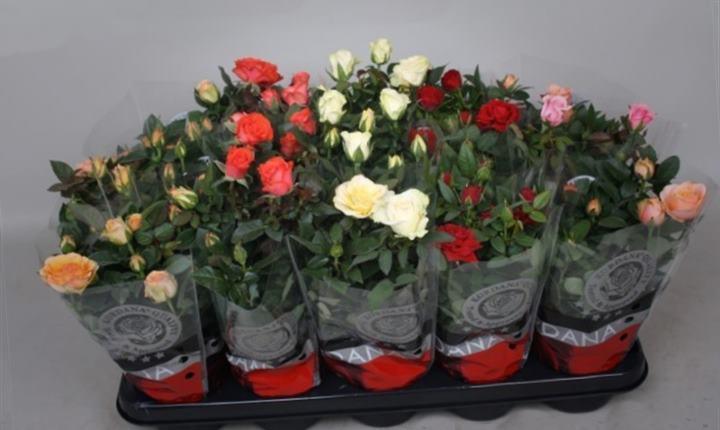
Pot and soil
The bush does not take up much space, it is suitable for growing outdoors or as a potted species at home. For planting in a pot, use a special soil for roses.It has all the essential minerals for its good development. It is also necessary to comply with all growing conditions.
In the open field of Cordana, the mix grows better. The place is chosen unshaded, well lit.
Important! Planting a bush next to tall trees and shrubs that obscure sunlight is not recommended.

Flower care
When caring for a flower, it is necessary to carry out regular feeding, cutting off weak branches, loosening the soil, to improve aeration, watering according to the regime.
Watering and feeding
Cordana roses love high moisture. They need a lot of water, but without overflow, so that stagnation does not form near the roots. If there is not enough moisture, then the topsoil will be dry. Basic rules for watering:
- Watered only with warm water, cold water can provoke powdery mildew.
- In the open field, especially in hot weather, the plant is watered every day.
- When growing a flower in a house, watered it at the root, the remaining water in the pan is drained.
- Every week, the bushes are sprayed no matter where it grows.
- If there is no time to water it often, then the water is poured into the pan, the plant sucks it in gradually through the roots. Moisture lasts for 1.5 months.
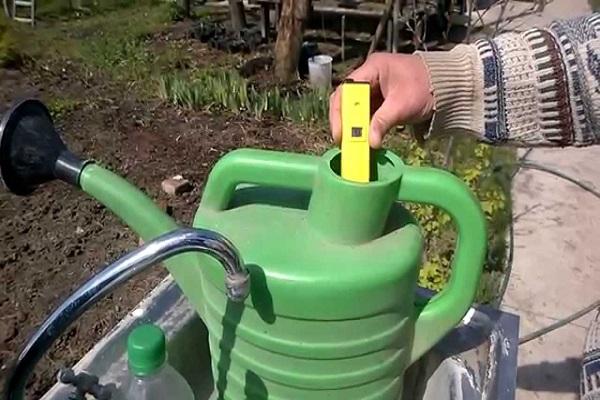
Also, for successful and long-term flowering, rose feeding is carried out. Fertilize it 2-3 times during the flowering period. At the beginning of spring with fertilizers, with nitrogen content, and in summer - with potassium and phosphorus content. Fertilizers suitable for groundbait Cordana:
- Epin. Promotes growth.
- Fitoverm. Destroys spider mites, spray every week.
- Topaz. Prevention of powdery mildew.
- Kornevin. Strengthens the roots.
Loosening
Loosening is carried out near the base of the bush after each watering in order to provide the root system with a sufficient supply of oxygen. Sprinkle with sawdust or peat on top to retain moisture at the roots. Sprinkle the plant when growing outdoors, at home, ordinary loosening is enough.
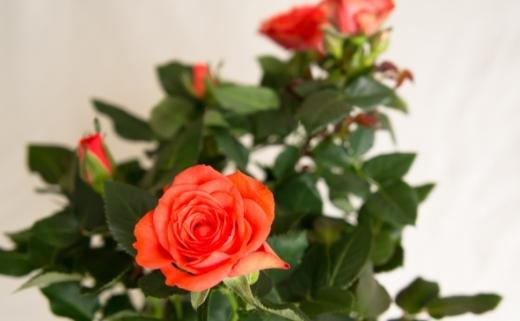
Pruning
For the appearance of more flowers, old, wilted ones are cut off. So that the plant does not waste its energy on ripening seeds. In indoor conditions, branch cutting is not carried out. When grown in open ground, the bush is thinned once a year, before flowering, to form new fruitful shoots. At the end of the season, dry and damaged areas of the bush are cut off.
How to transplant a rose
When buying a Cordana rose and wanting to transfer it to the open ground for the summer period, you must follow the planting rules. So that the flower takes root well and gives many flowers. The transplant is carried out as follows:
- Dig a hole of a suitable size.
- Manure and ash are poured into it.
- Sprinkle with warm water.
- They transfer the plant to the ground without clearing the roots from the ground.
- Sprinkle with earth on top.
- Sprinkle with warm water.
- Hilling.
- They make sure that weeds do not grow, they must be removed.
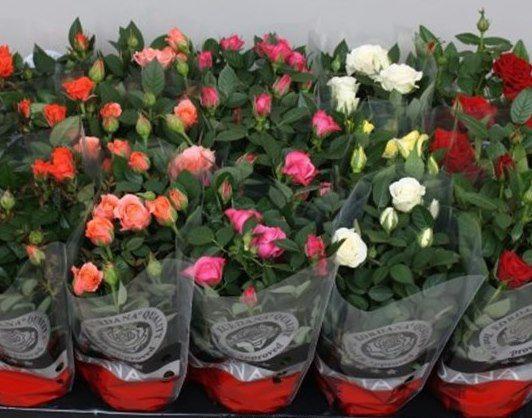
Cordana grows better outdoors. For the winter, it is covered with a warm film, transferred to a greenhouse, or transplanted into a pot again. They are transplanted into a pot according to the same principle as in open ground. Recommendations for choosing a pot:
- the pot must be plastic or ceramic;
- suitable size;
- a pallet is purchased additionally;
- there must be drainage plants in the pot.
Important! For transplanting into a pot, use the land from the site or acquire a special ready-made soil for roses.
Diseases and pests
The rose is susceptible to fungal, viral diseases, and harmful insects also affect it. For treatment and prevention, the bushes are treated with special preparations.

Fungal diseases
Most often, fungi infect plant leaves, they enter with dust, soil, and are transmitted through other plants.
Spotting
Dark spots form on the leaves, pour dry, turn yellow. The crown of the bush thickens.Diseases are promoted by dry air, overflow of plants, poor aeration of the roots. The affected areas are removed, the rose is sprayed with soapy water and copper sulfate.
Powdery mildew
When a flower is damaged, a white bloom forms on the leaves and buds. All affected areas are cut off, at an advanced stage, shoots are cut at the root. Leaving 4-5 centimeters on top. After that, they treat everything with which the affected bush came into contact with Fundazole or a similar drug. The development of the disease is facilitated by dry air, excessive fertilization. The processing is carried out several times.
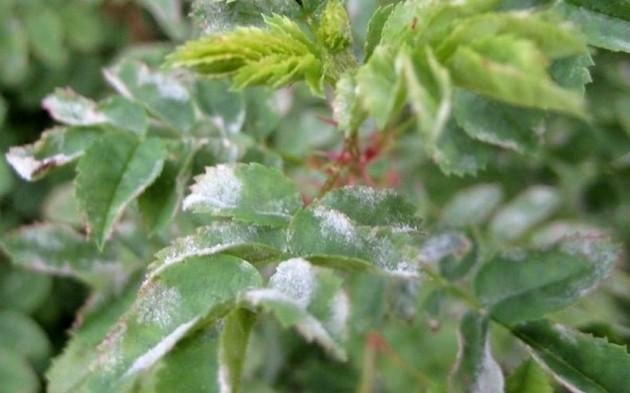
Downy mildew
Outwardly similar to the previous disease. It affects only the lower part of the leaf, and purple spots are also formed on them. Appears when over-watering. The damaged areas are removed, the bush is treated with a fungicide.
Infectious diseases
Like other plants, roses are susceptible to infectious or viral diseases.
Infectious cancer
Dense brown outgrowths appear on the stems and shoots of the bush. The affected areas die and die off, the infection penetrates the soil and lives in it for several years. All dead areas are removed, and the bush is treated with copper sulfate for several days in a row.
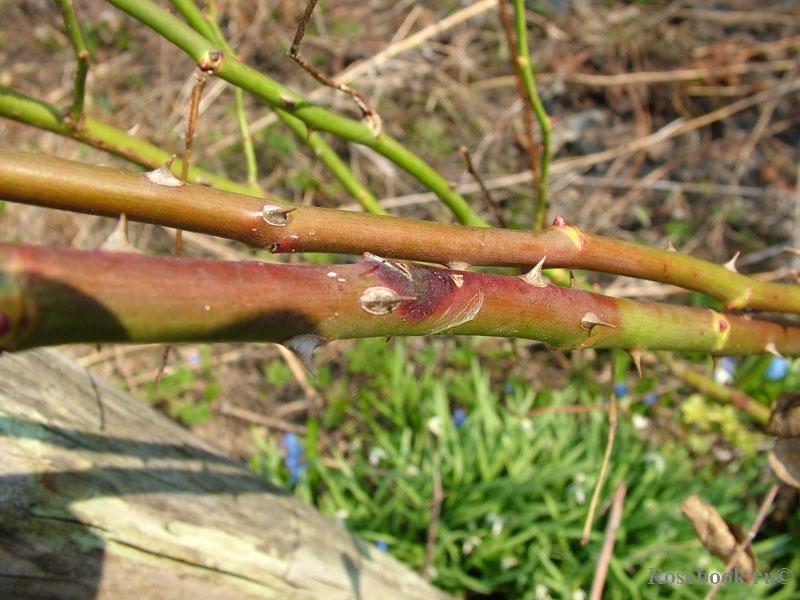
Jaundice
Yellow veins appear on the leaves, gradually their number and diameter increases. The plant dries up. To combat them, the affected areas are cut and burned. If the bush cannot be saved, then it is also burned.
Wilting virus
The bush does not develop well, bud ovary does not occur, the leaves dry, fade, and decrease in size. The disease is difficult to define and almost impossible to cure. The affected areas are cut off and burned, if the stage is neglected, then the whole rose is burned.

Infectious burn
Dry yellow spots form on the leaves, around a burgundy rim. The damaged areas are removed. If the disease has spread to the shoots, then the diseased part is cut off, and the place of the incision is covered with Ranet.
Insect pests
The most common pest is the spider mite. They are small and sit on the bottom of the leaf. They lay the larvae and reproduce. The bush withers, the leaves turn yellow and fall off, the buds crumble. They are treated with garlic or tobacco infusion. Plants are also sprayed with a solution of Aktellik, Neoron.
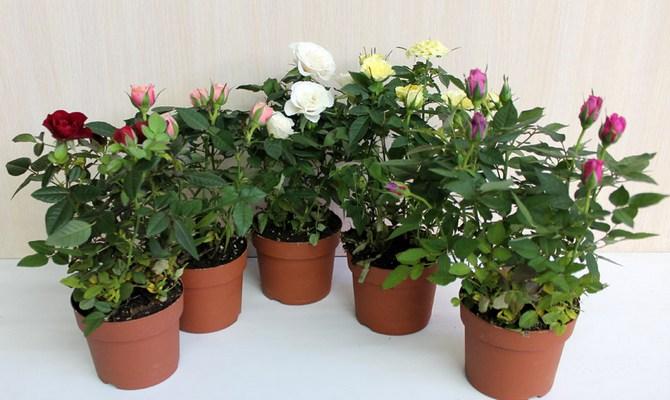
Important! It is recommended to carry out prophylaxis several times a year.
Breeding methods
The Cordana rose mix is propagated by grafting. Bush propagation is carried out in the summer. To do this, choose cuttings 2-3 centimeters thick. Then, do the following:
- Twigs are cut so that 2-3 internodes are preserved on each cuttings.
- A preparation for root formation is added to a container with water, cuttings are placed there.
- Do not change the water until the first roots sprout.
- When the length of the roots reaches a length of 2 centimeters, they are transferred into the ground.
- When grown in a pot, a separate container is recommended for each cuttings.
- The first 3-4 days are hidden from the sun.
- After the appearance of the first shoots, fertilize and watered regularly.
The rose develops intensively, after a month it begins to give the first flowers. They continue to care for the bushes according to all the rules for caring for the Cordana rose.
Rose Cordana mix has several colors. A whimsical plant to care for decorates the interior of the house and street flower beds. It is often used in the curb landscape. The plant loves high humidity, a lot of light and fresh air. In the open field it develops rapidly and produces a large number of flowers. In warm winters, the rose is able to endure wintering outdoors under a special shelter.
